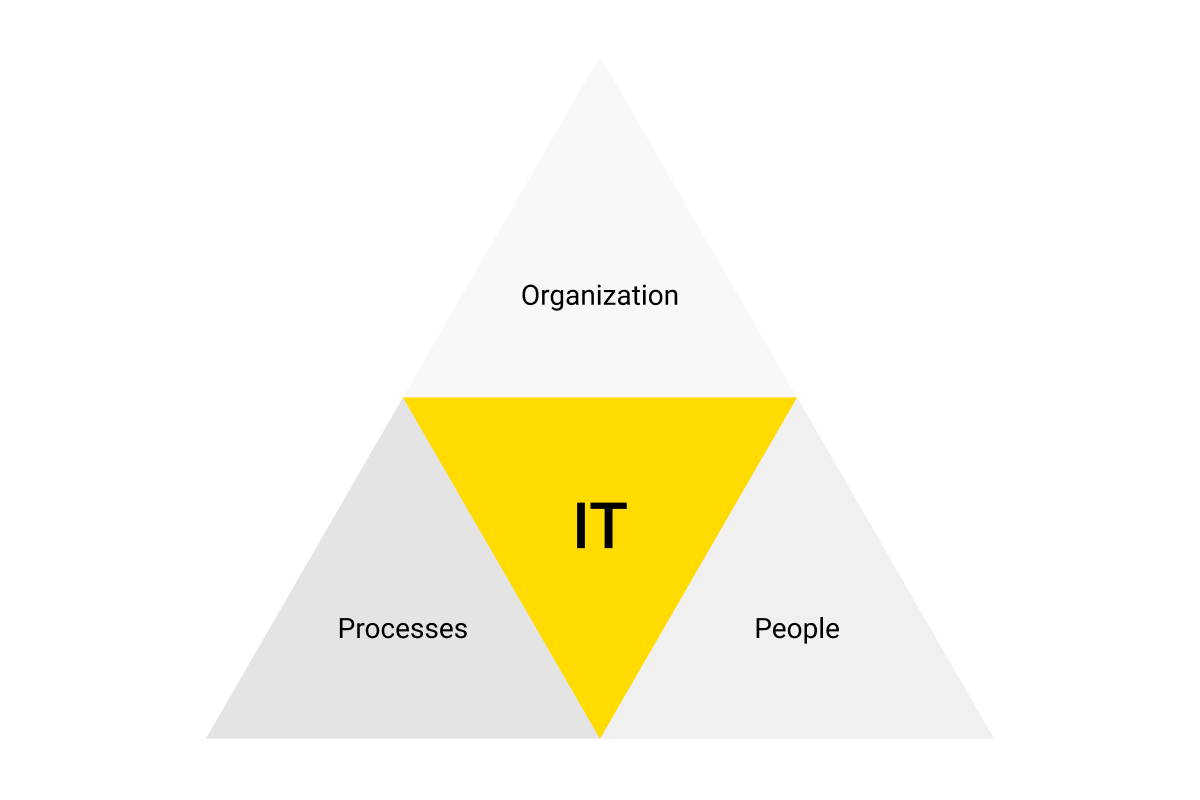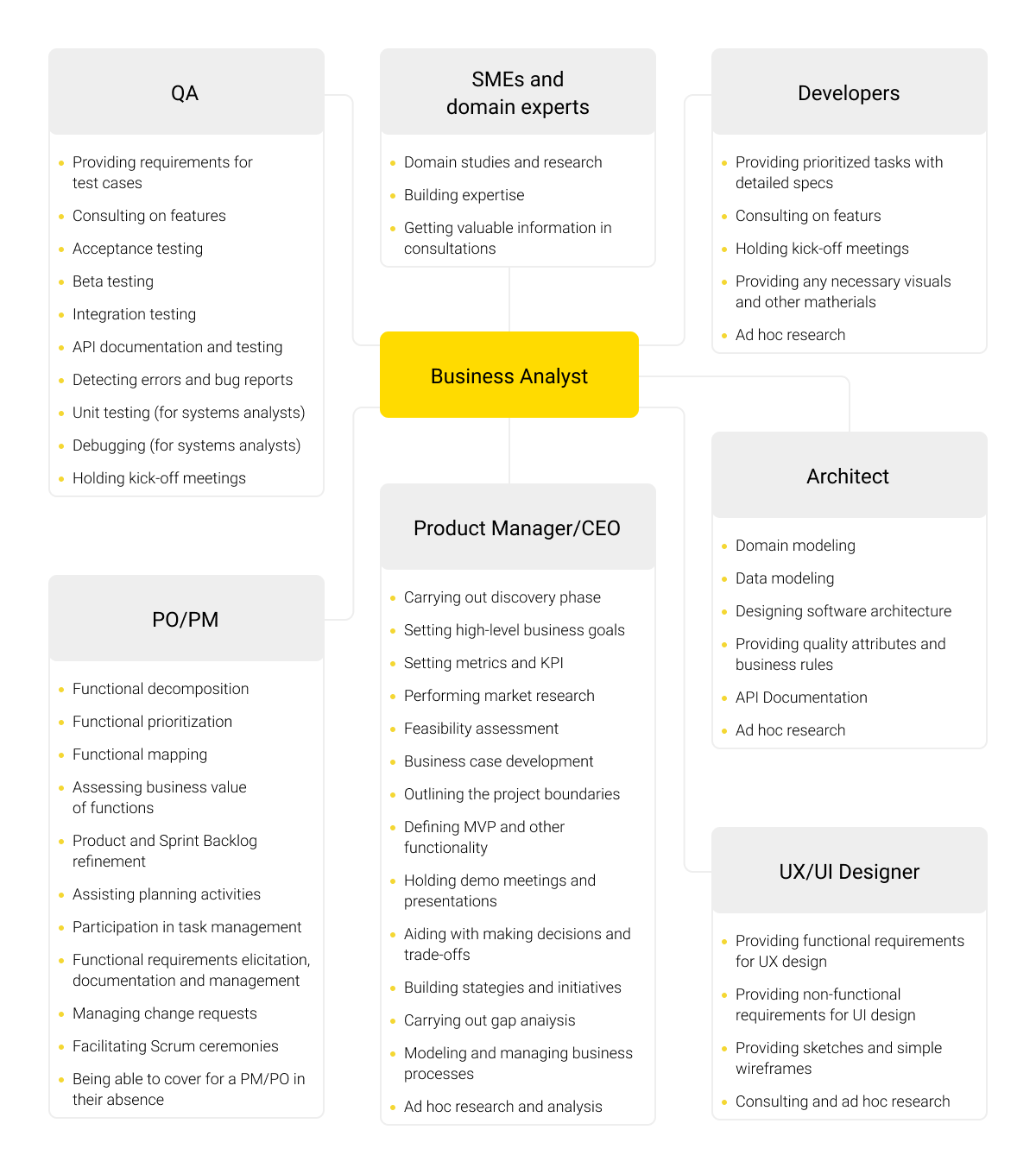- What is Business Analysis-as-a-Service and why can’t a project do without it?
- Key reasons to turn to Business Analysis-as-a-Service
- Business goals are unclear
- Your business is scaling up
- Nobody is working with requirements on your project
- Communication issues in your team or across teams
- Your technical experts don’t get clear tasks
- How to find a trusted Business Analysis-as-a-Service provider?
- Expertise
- Price
- Feedback
- To sum up
Despite the growing popularity of Business Analysis-as-a-Service many business owners still ask the question “Why do we need a Business Analyst on our project?” This is mainly because the role of a Business Analyst is seemingly opaque and vague. When considering Business Analysis-as-a-Service, we must mention not one but dozens of roles, which can be absolutely different and even stand on the opposite sides of the spectrum. These range from performing market research, setting business goals and metrics, drawing user story maps, and conducting a Discovery phase to designing software architecture and configuring APIs. Read on to learn what exactly Business Analysis-as-a-Service is and what it adds to an IT project.
What is Business Analysis-as-a-Service and why can’t a project do without it?
Business Analysis-as-a-Service, or BAaaS, refers to businesses consulting or otherwise making use of the expertise of professional Business Analysts employed by third-party companies. In this cooperation model, Business Analysts specially allocated to perform the work at the customer’s request use the industry’s best practices and proven techniques to provide a wide range of business analysis services, e.g. consult with customers on their projects, conduct market research and a Discovery phase, analyze and document business requirements, augment the customer’s project team, and more.
Although the value and the scope of work of a Business Analyst on a project are not always clearly determined, this is an inadequate excuse when you face the consequences of poor planning and analysis. These, in the absence of a Business Analyst, are either neglected or done insufficiently by another member of the team, be it a Team Lead, an Architect, or a Project Manager. This is bound to result in increased costs, delayed release dates, faulty functions, and, ultimately, an unhappy customer. In fact, the cost of a mistake in the planning and design stage is several times higher than that in the development stage.
Needless to say, an IT product must be designed to serve the needs of the customer and its end-users. Therefore, to make a good product, it’s critical to know these well, which requires a substantial amount of analytical work.
The IT industry stands at the intersection of organization, people, and processes. If any of those are neglected, an IT product might be deficient.

What is easier and less costly: to make some tweaks in the codebase or totally rewrite all the Git repositories because a function doesn’t work as expected? The figures provided by the Project Management Institute speak volumes:
- 60-80% of project failures are due to poor requirement collection, analysis, and management;
- 68% of companies are likely to have marginal success or fail outright because of poor business analysis practices;
- Companies pay a premium of about 60% on time and budget when they use poor requirements practices on their projects;
- Poorly defined applications contribute to a 66% project failure rate, which costs American businesses around $30 billion annually;
- 40% of software issues are detected by end-users;
- 80% of budgets are spent on fixing self-inflicted issues.
Key reasons to turn to Business Analysis-as-a-Service
The above facts make it clear that a penny-wise and pound-foolish approach may bring your project to a halt or, in the worst-case scenario, cause it to flop? Below are the five cases when it’s recommended to turn to Business Analysis-as-a-Service:
Business goals are unclear
Are you sure you know exactly what you want to get from a project? Do you really need these outcomes? Do you know what your clients need? Who is going to use your product and why?
A professional Business Analyst will use a scientific approach to help you set clear business goals, success metrics, and KPIs based on market research and product requirements analysis. They will define your target audience, build strategies, and outline project boundaries in a Vision and Scope document, as well as map all the business data using the Business Model Canvas.
Your business is scaling up
As your team, profits, and complexity of operations grow, you might find yourself in the middle of chaos. When the scope of work and documentation multiply, you definitely need an experienced Business Analyst who will clear up the debris of documentation and prioritize and arrange the product backlog.
Nobody is working with requirements on your project
In case eliciting requirements is no one’s direct responsibility, this job has a high probability of being missed. A seasoned Business Analyst will make sure that all the product requirements are prioritized and well-documented, be it business goals, functional requirements, or qualities such as screen and color resolution, the solution’s usability, security, etc. Thus, the product will meet the needs and expectations of both the customer and its users.
Communication issues in your team or across teams
It may appear that there are communication breakdowns either within the development team or across several teams. Perhaps, your team has little experience with Agile practices. The team members are working in isolation, and the work progress isn’t being synchronized across teams. A skilled Business Analyst will help a Project Manager facilitate Agile practices, be it Scrum or Kanban, and successfully manage the team.
Your technical experts don’t get clear tasks
Some developers don’t really like talking to other team members and making decisions. What they do like is clear and unambiguous specifications. When left without them, these specialists tend to provide solutions that are easy for them to implement and require less effort but aren’t always beneficial to users.
As it’s a Project Manager’s job to manage the tasks, a top-notch Business Analyst is of great help providing them with sufficient information about the product features, priorities, possible issues, assumptions, and restrictions. The Business Analyst destructures tasks into small atomic chunks and creates a detailed specification so that the developers can write the code. A well-elaborated specification helps you save time and cut project costs that could otherwise arise if some pieces of the product’s functionality have to be coded again. As you can see, BAaaS is not just a gimmick, it’s a necessity. The larger a project is, the more Business Analysts may be required for it to be a success.
Being a source of valuable information for everyone, Business Analysts assist a whole array of other experts in the team, e.g. Product Manager, Product Owner, Project Manager, QA engineers, development team, and architect. Meanwhile, a Business Analyst oils the wheels of the development process aiding everyone and facilitating all Scrum meetings.
Business Analysts are also responsible for accumulating domain expertise. To build such expertise, they read tons of documentation and literature and consult domain experts and subject-matter experts. Figuratively, a Business Analyst is a bridge between the development team and the customer.
Below are some real-life use cases demonstrating what tasks Business Analysts perform in collaboration with other specialists.

How to find a trusted Business Analysis-as-a-Service provider?
Finding a reliable Business Analysis-as-a-Service provider is not a trivial task, since it takes Business Analysts years of hard work and study to master their skills. Below are the key factors that you need to consider when looking for professional product development services:
Expertise
For your project, you will need experts knowledgeable in your industry. Andersen has a pool of skilled Business Analysts with years of experience in all major industries, including FinTech, Healthcare, Logistics, eCommerce, Enterprise, iGaming, and more.
To find out whether a vendor possesses sufficient expertise to successfully implement your project, have a look at their portfolio. A company with years of operation in the market will have a rich portfolio with projects of different complexities and involving different technology stacks.
Price
After analyzing your business needs, expectations, requirements, and limitations, a professional IT service provider will offer you several solutions to your problem, outlining the risks, costs, and timelines of each of them. A company of true experts always practices a customized approach to each of their partners, offering you a high-quality product that is tailor-made with regard to your unique situation.
Feedback
Finally, check dedicated market research platforms such as Clutch and GoodFirms for reviews and customer feedback. The companies with a proven track record are usually top-rated with these independent consulting firms.
To sum up
A professional Business Analyst is an asset to any IT project, adding to its value and contributing to cutting the project costs while delivering you a product of outstanding quality. Andersen’s team of expert Business Analysts apply best industry practices to their work, confirming their professionalism with multiple world-recognized certificates in the field of business analysis. If you are looking for a trusted Business Analysis-as-a-Service provider, do not hesitate to reach out to us for any help you might need with your IT project design and development.












